
 |
| Main Page |
| Photo Galleries |
| Writing |
| Aikido |
| Zen |
| Peeps |
| Links |
| Contact |

Venice
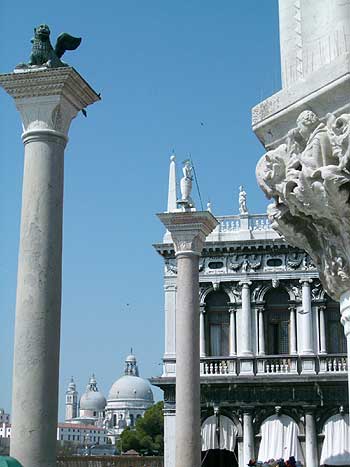 Leading
up to our time in Venice, which has now finally come about, I had some
trouble believing that the place could actually exist. Here's what I knew:
Leading
up to our time in Venice, which has now finally come about, I had some
trouble believing that the place could actually exist. Here's what I knew:
It has a big piazza. Okay. It's on an island. Check. It has a lot of old buildings, and some impressive churches. Alright...still sounding pretty standard for Italy. There are no streets - only canals - and they use boats instead of cars. Huh?
At this point it starts to sound like some strange fantasy land, something better suited for some work of fiction trying to find a novel angle for a 'city of the future' or 'waterworld' (wait, wouldn't that last one be an excellent concept for a movie?!).
So then you try to reconcile what you're hearing with reality. Apparently such a place does exist, so I try to think about what I've heard about it a little more. I remember seeing a documentary about it, hearing that the place is actually sinking, and that the Italian government has undertaken some massive project to control the water level in the lagoon in which the city resides. Ah hah! I have now connected the idea of the place with something I've seen on T.V., which means it must be real.
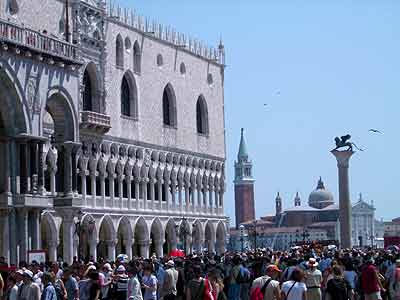 These
were the oh-so-intellectual thoughts going through my head as we chugged
along on the train from Ferrara to Venice. Sure enough, the train slowly
turned toward the coast, and before I knew it we were speeding over the
waters of the lagoon towards the alleged 'island city' of Venice.
These
were the oh-so-intellectual thoughts going through my head as we chugged
along on the train from Ferrara to Venice. Sure enough, the train slowly
turned toward the coast, and before I knew it we were speeding over the
waters of the lagoon towards the alleged 'island city' of Venice.
There was one little problem; Laura and I weren't staying in Venice. Our reservation in the city (which Laura had to sweat blood to get) wasn't until Sunday, and here was our train pulling in on Friday afternoon.
You
see, as I read our tour book one day - as one does during a vacation which
one has had no time to plan - I noticed a section entitled Festivals
in Italy, with a complete listing of the country's major festivals.
Perusing the list with only cursory interest, one entry popped out at
me; a fireworks festival and regatta in Venice. "Hmm", I thought,
"it probably isn't anytime that we can go." Held the third
weekend in July. Now I'm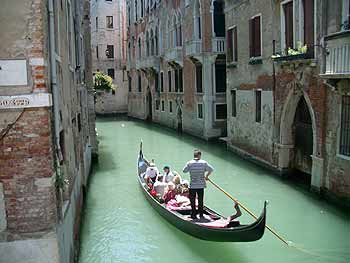 not a whiz with dates (I can never remember which months have 31 days),
but I did know one thing; it was already July.
not a whiz with dates (I can never remember which months have 31 days),
but I did know one thing; it was already July.
Straining my powers of calculation to the utmost I counted fingers and toes and came to a day: Saturday.
"Hey Laura," I started, trying to conceal my growing excitement at what I thought might be a happy coincidence, "what day of the week do we check in to our place in Venice?"
"Sunday." Laura replied. "Why?"
That is why we decided that staying in a campsite on the mainland would be a good idea. We could come a little earlier, and catch a unique festiva lin the process. Heck, the place was called "Camping in the City", and it was cheap.
So as we got off the train, eager to be dazzled by the magical city of Venice, our first order of business was to find a bus (okay, so cars can come onto the edge of the island) and leave again.
There were a lot of buses there, I thought, for a magical car-less island city. We finally found ours, and off we went. And went. The tiny town on the mainland faded into the distance behind us, then so did the cornfields outside of the town, then so did the airport, and the depot of abandoned military vehicles. "Wow!" I thought, "This place is magical...they made the whole island disappear!"
Evidently
"Camping in the City" can also be interpreted as meaning "Camping
15 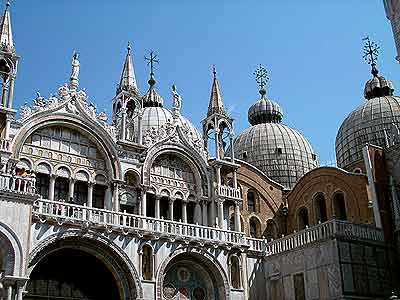 kilometers
away from the city on a separate land mass". A slight translation
error, I'm sure, that amounts to little more than a semantic difference,
really.
kilometers
away from the city on a separate land mass". A slight translation
error, I'm sure, that amounts to little more than a semantic difference,
really.
Well, Venice is in a lagoon. Lagoons, I think, are a pretty good breeding ground for mosquitos, thus making them poor places for campsites. But swollen, itchy ankles are another story.
My 'plan' was to get information from the helpful camp staff about the festival. It went like this:
"Where is the festival?"
"What festival?" the girl gave me a blank, disinterested look.
"The fireworks?" I made little exploding gestures with my hands.
"I don't know." she shook her head, unimpressed with my enthusiasm.
"The boat race?" Laura helpfully chimed in, making paddling
motions.
"No."
"Thanks for your help." I forced a smile, wanting to tug firmly
on her facial piercing.
We finally found out the details of the fireworks, though the regatta remained a mystery. By details, of course, I mean that we found out that they were to be held in Venice on Saturday night. No location, no time.
Our first night in Venice was an amazing one. After making the trip from our site in Siberia, we were left to wander the 'streets' in search of the festival.
The canals are, indeed, very neat. No cars! It's true. The city, at first, seemed like one big dock. But as we ventured further from the bus station on the island's periphery, I had to remind myself of something; this is an island. The reason the reminder is necessary is that genarally islands - like all pieces of land - have coasts. Venice, however, is built up straight to the very edges of the island to the point where no island is actually visible. None at all.
The more we wandered, the more we realized that the settlement that had started on this island had grown to the very edges, and then grown more dense within that space. Now I have been to many islands, and there is always the claim that 'space is at a premium', but never before have I seen a place where all the space is used. The miraculous, eery, incredible effect is that of a place that is, in the most thorough sense of the word, constructed. Think: hive.
The architecture remains solidly in the same style throughout, simply because the space was maximized long before modernization brought with it its particular brand of ugliness and sprawl. So on that first night, Laura and I found ourselves absorbed into the maze of streets - which the word narrow does not even begin to describe - that wound through the city.
After many failed attempts to procure the necessary information on the festival, Laura and I were finally directed to the city's largest square; the Piazza San Marco. The man that had given us the scoop, though helpful, could be no more specific than to say that they would take place at that spot sometime between ten o'clock and twelve o'clock.
To abbreviate a rather long story (as all attempts to make a long story short are now futile), we parked ourselves at the edge of the piazza overlooking the canal for more than two hours, waiting for something decisive to happen. The crowd grew steadily in size, and by the time the first starburst popped in the night sky, we were among a solid sea of people crammed together as far as we could see in every direction.
 The
crowd - many of whom had been waiting longer than we - went crazy with
the first crackle of the fireworks, and from that point on the sky above
the canal came alive. Sandwiched between the long, flat wall of the Palazzo
Ducale and the waterfront, we found ourselves in a bizarre soundscape
in which the echoes of the fireworks would reach us before the sound itself.
The
crowd - many of whom had been waiting longer than we - went crazy with
the first crackle of the fireworks, and from that point on the sky above
the canal came alive. Sandwiched between the long, flat wall of the Palazzo
Ducale and the waterfront, we found ourselves in a bizarre soundscape
in which the echoes of the fireworks would reach us before the sound itself.
After a spectacular show, the jammed piazza began to drain like a tub with the plug pulled, with the people funnelling into the narrow streets that led off in every direction...the end of a perfect night introducing us to the city of Venice.
The City
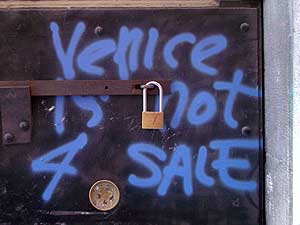 Venice
is a city. Amid the sea of tourists, that can be easy to forget. But tourists
aside, it is also easy to lose sight of the fact that it is a city simply
by virtue of its strange, fantastic and unnatural setting. But what is
also important is to realize that Venice was also more than a city. The
title of a book I saw in a shop window said it best; "Venezia;
La Citta, La Republicca, La Emporio", or "Venice; The city,
The Republic, The Empire."
Venice
is a city. Amid the sea of tourists, that can be easy to forget. But tourists
aside, it is also easy to lose sight of the fact that it is a city simply
by virtue of its strange, fantastic and unnatural setting. But what is
also important is to realize that Venice was also more than a city. The
title of a book I saw in a shop window said it best; "Venezia;
La Citta, La Republicca, La Emporio", or "Venice; The city,
The Republic, The Empire."
Walking through the maze of streets, hearing the chatter of a very different brand of Italian, it's important to remember that you're not really in Italy; you're in Venice. Venice was never Italian until very recently (there was no Italy); it was always Venetian. It was one of the great city states of Italy, fully independent and with its own culture, its own ambitions and its own sense of destiny.
What is so fascinating about the city as it is now is not just what the remains can tell us about the society as it was at its peak, but also what it means for a place so proud to be thrown on the historical scrap-heap by the marauding armies of a foreign power. Once a regional force to be reckoned with, sitting at the head of a broad empire, Venice was humbled by Napoleon then raffled off to the Austrians.
But what does that mean to the tourist? For Laura and I, it meant a lot of questions.
Our so-called hotel was actually a guest-house for the Protestant Church, but more than that, it was an old palazzo that had been donated to them. A palazzo is a palace; a residence for the rich and powerful. So there we were, paying a pittance to stay in a crumbling room with its cracked, frescoed ceilings, looking from our sculpted balcony onto the canals below. The place was a shambles, but everywhere you could see the signs of a place with a proud and glorious past. What happened? We really couldn't help but wonder.
And once you start wondering what happened, you can't help but notice the rest of the city. The place is in a fairly advanced state of decay. There are simply so many amazing buidlings that are so old that it is completely impossible to hold it all together. Walking along one day, we literally saw the place falling apart before our eyes as a chunk of a building crumbled off and fell on the guy ahead of us. It is somehow fitting that the island is actually sinking.
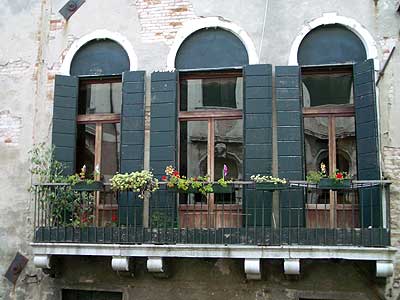 Our palazzo as reflected in the windows across the canal. |
To think of how Venice is, imagine New York. Only, think of New York as it would be one hundred years from now if it was no longer the international economic and cultural centre that it is today. Imagine instead that there was no business, no banking, no stock market. How would those bold, jutting skyscrapers look then? What impression would you have of the remaining inhabitants of that shell that once was the head of a global commercial empire?
That is Venice, to me. It is beautiful, it is breathtaking, it is romantic and it is filled with artistic treasures. But somehow, everything in Venice is rendered more poignant by the feeling of melancholy one can't help but feel as a chunk of plaster falls in the eye of the Korean tourist in front of them.